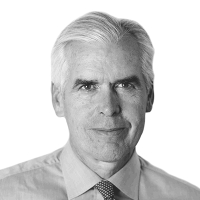
America urgently needs leadership. Yet Treasury Secretary Timothy Geithner has no sub-cabinet candidates even close to a confirmation hearing—after several earlier picks dropped out, the White House just announced that President Obama will nominate Neal Wolin as deputy secretary and Lael Brainard as undersecretary of international affairs.
Anyone with an unblemished record that can be objectively proved in agonizing detail is probably someone more focused on self-protection than accomplishment.
Except for a few holdovers from the Bush Treasury, there is no one with authority to send to meet with congressional committees or to coordinate with officials of other countries. These offices are empty because the confirmation process is an exercise in humiliation.
Purer than the driven snow: That’s the standard aspiring public servants must satisfy. Ever since Zoe Baird’s nanny debacle, nominations are treated as a “knockout” process in which any infraction is reason for disqualification. This has proved to be a slippery political slope, leading to an appointment process focused more on avoiding (or causing) embarrassment than recruiting the most able people.
Many excellent candidates have withdrawn when confronted with grilling over nanny taxes, receipts for $20 tax deductions, and demands for every potentially embarrassing email. If a nominee makes it past the White House inquisition, Congress then starts picking them apart, critiquing past business connections or any statement made in a long career. The hypocrisy is breathtaking—the same members of Congress took huge contributions from AIG, Fannie Mae, and big banks. The media then throws its sanctimony onto the bonfire. What sensible person would subject himself to this fury of self-righteousness, reminiscent of the 15th-century religious fanatic Savonarola?
Let’s start over.
Change the goal: We need people who can do the job, not saints. “The force of character,” Emerson observed, “is cumulative.” Character cannot be judged like a perfect score on a multiple-choice test. Anyone with an unblemished record that can be objectively proved in agonizing detail is probably someone more focused on self-protection than accomplishment. For the first head of the Securities and Exchange Commission, FDR appointed a Wall Street insider, Joseph P. Kennedy—who better to understand the tricks of Wall Street?
Change the process: Create an independent bipartisan committee to vet character and conflicts, mainly through reference checks. Such a committee can judge people in full, not as an atomistic collection of receipts and isolated life events. Its independent approval will turn down the partisan heat and mute the force of congressional finger-pointing when the occasional nominee turns out to have been a mistake.
Obama set himself up for failure when he pledged that no one with recent lobbying experience would be considered. I’m no fan of lobbyists, but almost any litmus test will work against the public interest, as I believe it did with Tom Daschle. Obama should abandon the perfect virtue standard.
America needs action, not paralysis. The place to start is creating a sensible appointment process that can evaluate people’s strengths as well as their weaknesses.
Philip K. Howard, a lawyer, is the author of Life Without Lawyers: Liberating Americans From Too Much Law , just released by W.W. Norton, and the bestselling The Death of Common Sense . He is chairman of Common Good and advises leaders of both parties on legal and regulatory reform.




